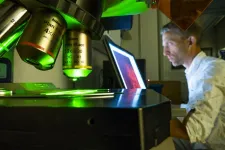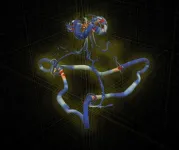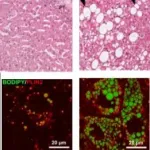Researchers develop promising way to find new cancer drugs
2021-01-25
(Press-News.org) All the cells in the human body share the same genes. But how our genes are expressed determines whether a cell becomes a brain cell or a liver cell. In addition, changes in gene expression often play a significant role in development of diseases.
One mechanism that contributes to the changes in gene expression is the interaction between the proteins called histones and enzymes known as HDACs. These enzymes help the cell divide and develop, which is the reason why they serve as targets for anti-cancer medicine: When you inhibit the enzymes, the cancer cells will stop dividing and growing further.
Despite being targets for clinically approved medicines, researchers do not know all the details of how they work in the cell. Now, researchers from the University of Copenhagen have developed a method that will help change that.
"We have shown details of how these enzymes interact with proteins around our DNA, and our method provides a new means for identifying possible anti-cancer drugs very quickly. In the study, we show that the method works: We synthesized a peptide that affected just the right parts of living human cells, using the same target as anti-cancer medicine uses today," says Carlos Moreno-Yruela, postdoc at the Department of Drug Design and Pharmacology.
Unmodified peptide had effect
HDACs are a group of eleven different enzymes, which means that targeting them all at once with a non-selective medicine will result in affecting many essential processes in the body. This may also explain some of the side effects in the clinically approved HDAC-inhibiting anti-cancer medicine.
"Our detailed insight into the enzymes' interactions gained with the new method provide hope for the development of more specific HDAC inhibitors with potential as drug candidates. This could bode well for the development of more sophisticated compounds for cancer therapy with fewer side effects," says Professor Christian Adam Olsen.
In the study, the researchers used the new method for identifying peptides, which they resynthesized in larger amounts and subjected to human cells. The results were exactly what they hoped: The expected HDACs were also inhibited in living cells.
"We were surprised to see such a prominent effect of an unoptimized peptide in cells. Normally, one would need to introduce a variety of modifications to optimize its properties. But this, almost fully natural, peptide had a really potent effect, which emphasizes the potential of our findings," says Christian Adam Olsen.
The researchers now hope to use the method for identifying promising drug candidates which could go on to pre-clinical testing.
INFORMATION:
ELSE PRESS RELEASES FROM THIS DATE:
2021-01-25
Special immune cells found in the brain, microglia, play a key role in the processes that make you feel uneasy and depressed in correlation with inflammation. This is the conclusion of a study using mice carried out by researchers at Linköping University, Sweden. The results have been published in the scientific journal Immunity, and suggest that microglial cells contribute to the negative mood experienced during several neurological diseases, and maybe also depression.
David Engblom's research group at Linköping University has spent many years looking at why inflammation in the body, such as a common cold or influenza, causes us to feel poorly ...
2021-01-25
Artificial intelligence and automation are changing the world, one industry at a time! Whatever humans can do, machines are learning to also do effectively, with lower costs and fewer errors. The maritime shipping industry is no different. Ships are now increasingly automated (called maritime autonomous surface ships or MASSs), reducing the need for human input. While this bodes well for labor and fuel costs, the question naturally raised is, what happens to the jobs of seafarers, the chief workforce of the shipping industry, once MASSs take over.
To find out, researchers from Korea used complex mathematical models and simulations ...
2021-01-25
RESEARCH TRIANGLE PARK, N.C. -- Design of Army aerial vehicles and weapon systems relies on the ability to predict aerodynamic behavior, often aided by advanced computer simulations of the flow of air over the body. High-fidelity simulations assist engineers in maximizing how much load a rotorcraft can lift or how far a missile can fly, but these simulations aren't cheap.
The simulations that designers currently use require extensive data processing on supercomputers and capture only a portion of vortex collision events - which can cause significant performance degradation, from loss of lift on a rotor to complete loss of control of a munition. A new turbulence model could change that.
The Army Research Office, an ...
2021-01-25
Teenagers with happy childhood memories are likely to drink less, take fewer drugs and enjoy learning, according to research published in the peer-reviewed journal END ...
2021-01-25
New Orleans, LA - An analysis by Nicholas Gilpin, PhD, Professor of Physiology and Associate Director of the Alcohol and Drug Abuse Center of Excellence at LSU Health New Orleans School of Medicine, and Michael Taffe, PhD, Professor of Psychiatry at the University of California San Diego, summarizes long-standing racial inequities in federal funding for biosciences research from the National Institutes of Health (NIH). Their report describes prior failures to correct these racial inequities and offers strategies that may be effective in eliminating these disparities. Their paper, published online in the open-access ...
2021-01-25
Nonalcoholic fatty liver disease (NAFLD) is a widespread condition in the Western World. Around 30% of the population have lipid droplets stored in their liver which diminish its function in the long term. Main causes for NAFLD are our high-caloric diet in combination with a sedentary lifestyle. Hitherto, researchers have not fully understood the cause of this disease and despite the high number of affected individuals, there is no approved therapy.
In order to improve our understanding of the basic mechanisms underlying the etiology of NAFLD, Dr. Nina Graffmann, Prof. James Adjaye and the team of the Institute for Stem Cell research and Regenerative Medicine from the University Hospital Duesseldorf differentiated induced pluripotent stem cells (iPSCs) derived from healthy ...
2021-01-25
Using a combination of telescopes, including the Very Large Telescope of the European Southern Observatory (ESO's VLT), astronomers have revealed a system consisting of six exoplanets, five of which are locked in a rare rhythm around their central star. The researchers believe the system could provide important clues about how planets, including those in the Solar System, form and evolve.
The first time the team observed TOI-178, a star some 200 light-years away in the constellation of Sculptor, they thought they had spotted two planets going around it in the same orbit. However, a closer look revealed something entirely ...
2021-01-25
CHICAGO (January 25, 2021; 9 am CST): A new study finds that older cancer patients are less likely to have optimal results following their cancer operation if they live in an area highly affected by social challenges, especially if they are racial-ethnic minorities. The study was selected for the 2020 Southern Surgical Association Program and published as an "article in press" on the Journal of the American College of Surgeons website in advance of print.
Study investigators from The Ohio State University (OSU) used a novel risk stratification tool called the social vulnerability index (SVI), a composite measure of 15 social and economic factors. ...
2021-01-25
The key factor in preventing non-communicable diseases is lifestyle management at the individual level with a focus on such innovations, which can help increase the awareness of risk factors management in society, claim an international team of researchers, among them - scientists from Kaunas University of Technology (KTU), Lithuania in a recent study. According to them, the management of cancer, diabetes, cardiovascular and respiratory diseases requires many strategies from several perspectives and on different levels.
Non-communicable diseases (NCDs), also known as chronic diseases, are medical conditions that are ...
2021-01-25
What happened to the promised applications of graphene and related materials? Thanks to initiatives like the European Union's Graphene Flagship and heavy investments by leading industries, graphene manufacturing is mature enough to produce prototypes and some real-life niche applications. Now, researchers at Graphene Flagship partner The Fraunhofer Institute for Systems and Innovation Research (ISI) in Karlsruhe, Germany, have published two papers that roadmap the expected future mass introduction of graphene and related materials in the market.
Back in 2004, graphene was made by peeling off atomically thin layers from a graphite block. Now, thanks to the advances pioneered by the Graphene Flagship, among ...
LAST 30 PRESS RELEASES:
[Press-News.org] Researchers develop promising way to find new cancer drugs





